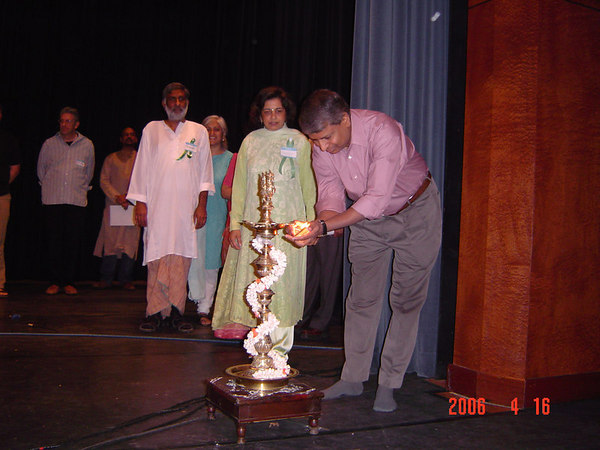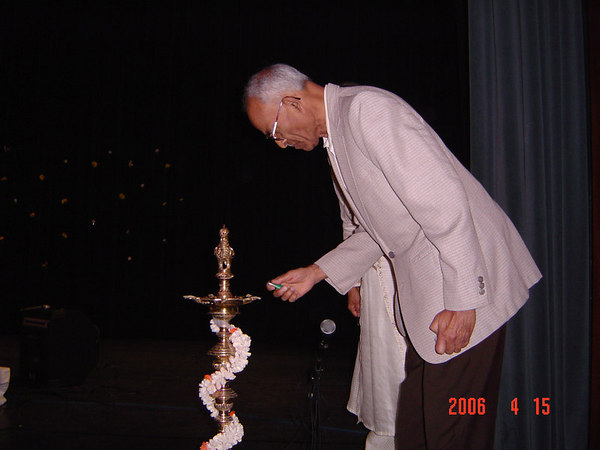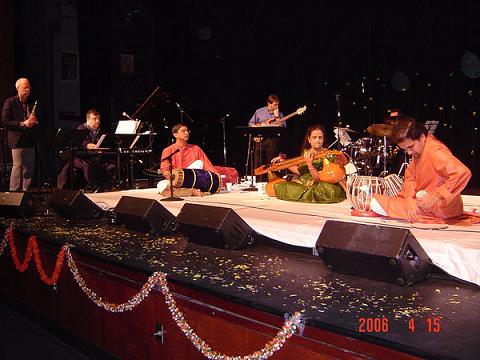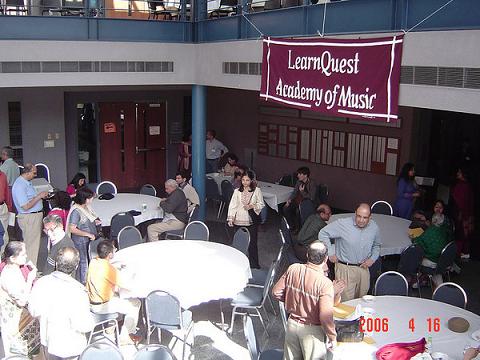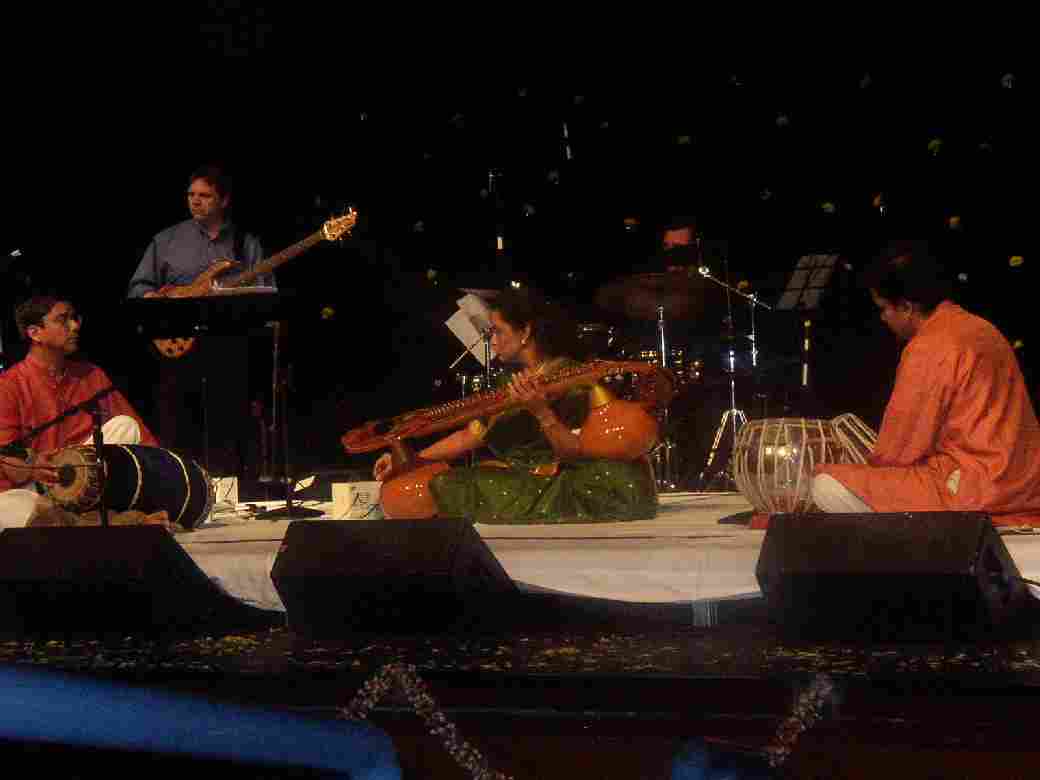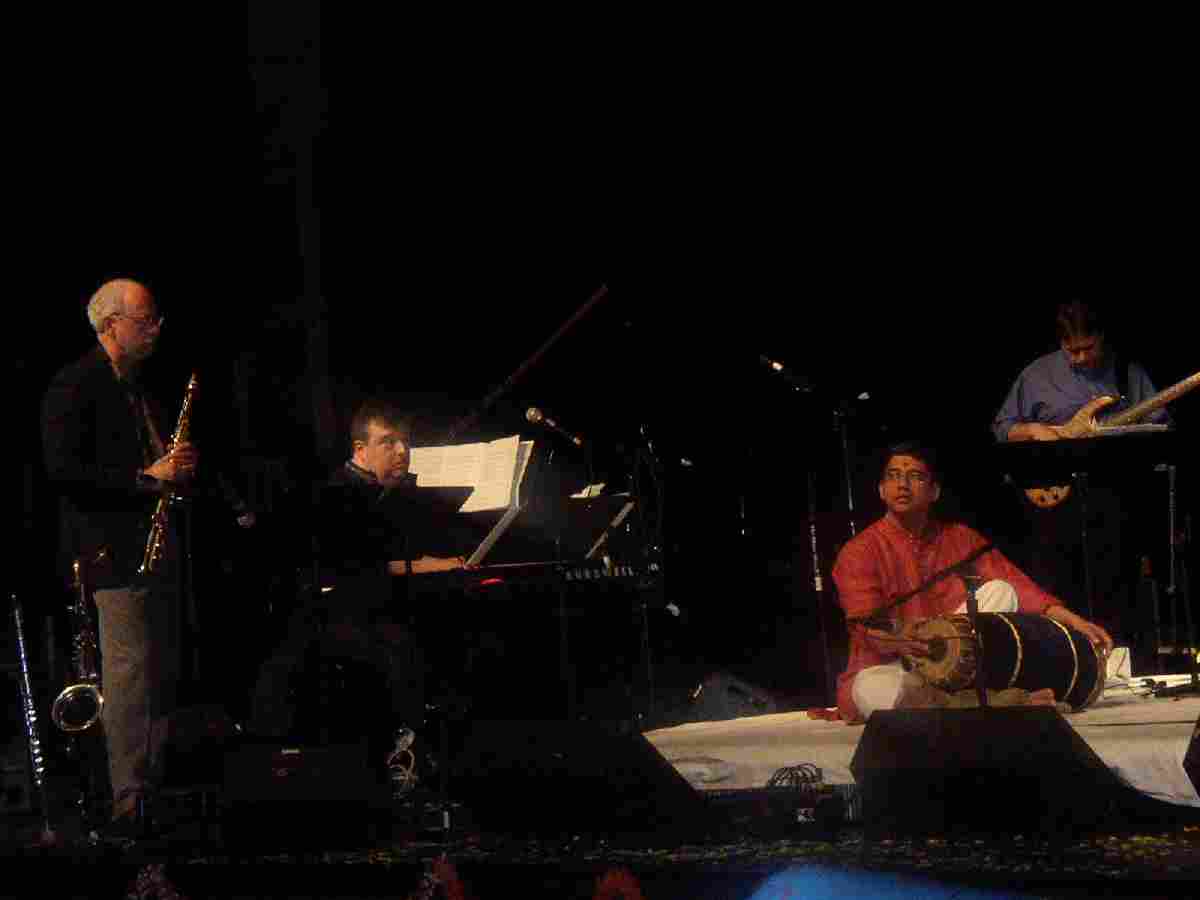Contribute
| LearnQuest Hosts Music Conference With Success |
by Shuchita Rao
04/27/2006
WESTON – Red and white flower garlands adorned the stage covered with sparkling white sheets. A white banner reading “LearnQuest Academy†stood out prominently against yellow flowers pinned on deep purple velvet curtains in the 650 seat capacity auditorium at Fine Arts Center at Regis College. Music lovers from New England gathered to participate in a unique 2-day music conference that featured not only local artists but also several of the top-notch leading musicians from India. The event was inagurated by Suresh Mathur and Desh Deshpande. The conference featured all day long multiple, back to back music performances and lecture-demonstrations on Indian Classical Music.
The music conference was organized by LearnQuest Academy of Music, a non-profit music school, based out of Waltham, MA providing instruction in Indian Classical Music. The concerts began at 10A.M on April 15 and April 16. Titled “Sangeet Sammelan†, the conference successfully created the aura of “Sangeet Sammelans†that run continuously over a period of 2 or 3 days and are held annually in several parts of India. Tickets were priced at $45 each day. Over 350 people attended the conference.
To the members of the audience interested in the knowing about the history and theory of Indian Music, lecture demonstrations titled “A Historical Perspective on Indian Classical Musicâ€, “Gayaki and Tantrakari styles in Indian Instrumental Music†, “New Technologies/Ancient Traditions; Encounters in Indian Classical Music†were presented by 3 scholars.
For vocal music lovers, several forms of North Indian classical music including Dhrupad, the oldest living form, Khyal, Thumri, Tappa, Chaiti, Kajri and Bhajan were featured. The ragas presented ranged from ragas Bhatiyar, Gujri Todi, Bilaskhani Todi presented in the morning sessions, Shuddh Sarang, Madhuvanti, several varieties of Kafi in the afternoon session and Yaman, Shree Kalyan, Jaijaivanti, Hansadhwani, Vachaspati, Pahadi and Bhairavi in the evening sessions.
The instruments that were presented included the rare Indian wind instrument shehnai, the flute, string instruments, sitar, sarod and sarangi as well as percussion instruments mridangam and tabla. “ I haven’t heard the Shehnai in years. It was wonderful to hear it.†Said Raj Sharma, a concert attendee.
There were also fusion performances presented on each day of the conference. An energetic and vibrant fusion performance blending music from east and West featured local masters on western instruments such as piano, keyboard, saxophone, western flute, bass guitar and drums with Indian instrument veena was presented on the first day. On the second day, fusion music between flute in the Carnatic or South Indian style and Sitar in the North Indian or Hindustani style was presented.
“ I am originally from Lebanon and the music I have been hearing reminds me of the music of my country. We have instruments in the string and percussion categories quite similar to the ones presented here. I am also enjoying delicious Indian food, which is conveniently available at all times of the day in the lobby. This is a wonderful treat and I feel like I am getting a complete taste of India.†Said Jack Hajj, math professor at Suffolk University, MA.
“It is truly a great event to bring the leading musicians of India to one place at one time for the pleasure of classical music lovers. If this is the first time this is being done, I can safely predict that in a few years, such a conference will invite not hundreds but thousands of music lovers.†Said Suhas Vyas. Vyas is a renowned vocalist from Pune, India who organizes music conferences called “Gunidas Sammelan†in 3 cities of India (Mumbai, Delhi and Kolkatta) every year.
It took more than an year to plan this conference. Some people who worked long and hard behind the scenes for several months to make it success are Ranjit Desai, Dipankar Deshmukh, Satyajit Ray, Roopa Bhide, Hardeep Singh, Jaspal Singh, Bhanu Jayaraman, Rajesh Godbole. “People seem to like the two-day conference. I am receiving requests from many people to repeat such an event next year. I am grateful to the members of the conference committee and volunteers for all the effort they have put into making the dream real. It was truly a collective effort.†Said Pradeep Shukla, president of LearnQuest Academy of Music.
Viewers share their views:A special report from Kumkum Dilwali:
Ustad Imrat Khan opened the morning session with a style of humor that is rather unique for a maestro of his caliber. He gracefully informed the audience that, since the Shehnai master Ali Ahmad Hussain Khan was running late that morning, he agreed to fill the time with something worthwhile. What he offered was a myriad of candid insights about his own musical upbringing, as well as his philosophy about the role of music in shaping cultural values. He shared how he was originally a singer, not an instrumentalist. As he hummed the key notes and intonations of various ragas, he demonstrated the connection between the human voice and the sitar that lay in front of him. The richness of his voice was unmistakably that of a trained classical vocalist. Effortlessly, with anecdotal examples, he reminded the audience of the quality of classical music from his time, where words were not necessary to create and convey a mood. Khan Sahib continued with a comment that many modern styles of pop music, especially those that lack the basic tenets of sur, taal, lai, and bhaav, and are simply variants of noise, and add to the discord, rather than the harmony that is the hallmark of classical music. Declaring music as the medium between people and their God, he suggested that reference to one deity versus another labeled and separated the Meera bhajan from the Kabeer bhajan, the worship of Ram from the worship of Rahim. He added that some forms of classical music, with minimal words, expressed devotion in its purest form. This lecture demonstration that included the Gayaki and Tantakari styles of instrumental music was a wonderfully informative and provocative way to commence the Conference.
The shehnai performance by Ustad Ali Ahmad Hussain Khan that followed was a different experience altogether. It was a testament to his absolute mastery of the raga form and of his craft. This double reed wind instrument is closest in timbre to a droning saxophone. His troupe included his accomplished student who provided shehnai support, Shubhen Chatterjee on tabla, and background of tanpura and santoor. As the sound of shehnai permeated the auditorium, a continuum was created, and the mood shifted from somber to soothing to celebratory. The jugalbandi, or playful exchange between the two shehnais, enhanced each offering. Although Khan Saheb offered no description or explanation of his compositions, the prolonged standing ovation he received confirmed the connection he made with his audience.
From a Lokvani Correspondent :
Fusion : Triveni - Music requires devotion and discipline and to accomplished global artists a chance to elevate its tastes by acquiring an audience beyond the regular listener. The Learn quest music conference added an international flavor to the occasion with the concert ‘Triveni ‘ which included jazz by the Marc Rossi Group, and a jazz-Indian fusion set featuring Marc's group plus accomplished veena player, Durga Krishnan along with U. Mahalingam on the Mridangam and Vijay Ghate on the Tabla. On the Jazz side, artists who took the stage were Marc Rossi, composer, piano, and keyboards, Lance Van Lenten, Saxophones and flute, Bill Urmson, Bass, Mauricio Zottarelli, drums. The group gave a taste on how two distinct classical styles may merge and produce pleasing and stimulating music. While Fusion may have its critics, it also has its admirers who acknowledge its boldness, its surreal nature and its new impulses. The second piece, titled ‘Reminiscence’ composed by Durga Krishnan in Raaga Hindolam certainly allowed many in the audience to appreciate the beauty of such an exercise where even die hard traditional classical music lovers applauded. The piece, started with the Pallavi in the 7th beat which Durga Krishnan explained is unusual in Carnatic music and set the tone of the entire composition that ended with a lot of musical exchanges and improvisations among the artists accompanying the piece The unique jazz and Carnatic mix was just right, without sacrificing the Raagas and made the melody and rhythm inseparable.
Marc’s opened the concert with a mention of his friends Geeta and Frank Bennett and a piece The Joy of Wisdom ( Raag Kalyani) written for his group with added Indian musicians. The last piece that they performed was Ascending Dreams in Raag Charukeshi which Marc remarked was an inspiration from maestro music master, Ali Akbar Khan.
You may also access this article through our web-site http://www.lokvani.com/
